
Breadcrumb
MSN Testimonials
MSN-CNL -- Why Iowa?
Video - Testimonial
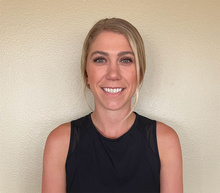
Briefly explain your project.
The purpose of my capstone project was to implement an ABCDEF rounding tool to decrease ICU induced delirium. In critical care units, patients often suffer from a type of confusion due to lack of sleep, mobilization and deliriogenic medications. The tool was used during morning rounds while PT, OT, Pharmacy, patient assigned physicians and nursing were present so any changes to a patient’s care that needed to occur would be approached and dealt with as a team.
Explain your future plans as a clinical nurse leader.
My immediate plan is to work for 2-3 years as an ICU unit manager before expanding into more of a CNO role for a hospital. I foresee focusing on hospital policy and procedures to help staff grow in a safe and progressive hospital.
How did the UI College of Nursing prepare you for your new role?
The University of Iowa College of Nursing provided me with the freedom to travel nurse while receiving an education. This was no easy task, but the professors and classmates helped provide flexible andragogy while working around time zone changes, outside hospital policies and different macrosystems.-- Claire Morris (MSN-CNL ’22)
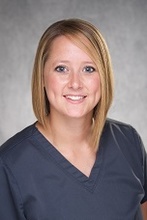
Briefly explain your capstone project.
My capstone project was titled “Improving Clinical Competency Using a Surgical Cross-Training Bootcamp: A Pilot Project”. The purpose of this project was to create an evidence-based practice (EBP) training bootcamp for nurses being cross trained to recover open heart surgery patients. The project took place in the Cardiovascular Intensive Care Unit (CVICU) at the University of Iowa Hospitals and Clinics. It focused on increasing clinical knowledge related to caring for open-heart surgery patients during the initial post-operative phase by evaluating each nurse’s knowledge level through a written assessment before and after attending the surgical cross-training bootcamp, increasing self confidence in caring for open-heart surgery patients during the initial post-operative phase by assessing each nurse’s perceived self confidence level with specific skills and situations through the completion of a confidence self-evaluation assessment before and after attending the surgical cross-training bootcamp, and creating a process to validate competency through return demonstration utilizing a standardized hands-on orientation checklist and through the completion of a competency validation exam in which the nurse must achieve an 80% or higher. The long-term goal is for this practice change to become the standard of practice nurses who are being oriented to admit open-heart surgery patients. To date, the surgical cross-training bootcamp has shown to improve confidence and clinical competency in the nurses that care for immediate post-operative open-heart patients. The bootcamp has allowed participants to focus on the application of their learning versus trying to learn and apply the knowledge simultaneously.Explain your future plans as a new advanced nurse practitioner or nurse leader.
As a CNL graduate, my plans include seeking out a role within an institution that values the CNL role especially as an educator and as a clinician. While serving in this role, I will strive to apply the CNL competencies that I have learned throughout the program that have prepared me to be a change agent in any environment. I am looking forward to the future opportunities that are available because of my specialized training as a clinical nurse leader. Outside of my current practice, I plan to be involved in the Clinical Nurse Leader Association and the Association of Critical Care Nurses. I am currently working on publication of my capstone project.How did the UI College of Nursing prepare you for your new role?
The University of Iowa College of Nursing has helped me to build an even stronger foundation in nursing practice and has allowed me to expand my knowledge to areas that can make a large impact on clinical practice. The faculty, especially my advisor, has challenged me throughout my journey and pushed me to think creatively especially during unprecedented times. I am forever grateful for the opportunities and the connections I have been able to make while at Iowa. I know that the experiences that I have gained during my time at Iowa will forever impact my career as a nurse. I am proud to be an alumnus of the University of Iowa College of Nursing and know that just the title alone will open doors throughout my career along with the knowledge and skills that it has instilled throughout my journey. I would highly recommend the University of Iowa MSN-CNL program to anyone looking to further their nursing education.-- Lauren Maus (MSN-CNL ’21)
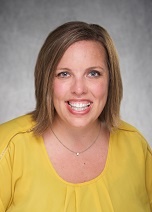
Briefly explain your capstone project.
My capstone project was titled “The 3’Cs of Skin to Skin Holding: Communication Color, & Consistency.” The purpose of my project was to develop and implement a standardized approach to improve opportunities and consistency of skin-to-skin (STS) holding. The project took place in the Neonatal Intensive Care Unit (NICU) at the University of Iowa Stead Family Children’s Hospital. The project included an innovative color guideline system which determined infant eligibility for STS holding. Color guidelines were developed to promote consistency among caregivers for STS opportunities based on infants’ eligibility. This eligibility color was displayed through a rotative kangaroo wheel. A color displayed as green determined an infant was eligible for STS holding, a yellow displayed color represent caution and encouraged a multidisciplinary conversation on infant eligibility, and red represented the need for other interventions for infant-parent bonding due to ineligibility for STS holding. The green, yellow, or red spinning kangaroo wheel was displayed at the infant’s bedside providing parental awareness of eligibility. The bedside nurse determined infant’s eligibility color based off guidelines which provide specific infant examples placing them in eligibility categories. The overall outcomes of the project showed statistical significance in decreasing the number of days to first STS holding occurrence and decreased the percent of infants never held STS.Explain your future plans as a new advanced nurse practitioner or nurse leader.
As a CNL graduate my plans includes maintaining a position that allows me to use the CNL skills at the University of Iowa Stead Family Children’s Hospital neonatal intensive care unit. As a practice leader I will strive to apply the CNL competencies to improve the neuroprotective care and outcomes of premature infants. I will focus on building evidence based neonatal practices, improving quality nursing metrics, and improve the patient-family experience. I will incorporate leadership skills to motivate and support a robust multidisciplinary NICU team. I am looking forward to the future of neonatal care! Outside of my current practice I plan to be involved in the Clinical Nurse Leader Association and the Neonatal Nurse Association. I am currently working on publication of my capstone project.How did the UI College of Nursing prepare you for your new role?
As a masters graduate the college of nursing has prepare me with the knowledge, skills, and leadership qualities for a strong foundation as a clinical practice leader. The faculty, especially my advisor, have shaped my abilities to promote evidence-based practice in a large complex neonatal intensive care unit. The leadership qualities will prepare me to use critical thinking skills, optimize intraprofessional communication, and mentor bedside nurse. The CNL program and faculty support have given me the opportunities to positively impact the staff, patients, and families I care for. Overall the college of nursing have inspired my abilities to achieve excellence in CNL practice! Most importantly I am proud to by a Hawkeye alumna! Go HAWKS!-- Marissa Johnson (MSN-CNL ’20)
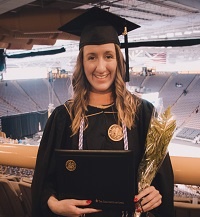
Briefly explain your project.
The purpose of my Capstone Project was to implement and evaluate evidence-based teaching methods for patients receiving In Vitro Fertilization (IVF) treatment at University of Iowa Hospitals and Clinics (UIHC). I utilized the Quality Improvement Model as a formal approach to enhance patient education, satisfaction, and empowerment by providing an alternate teaching method for IVF patients on the UIHC website.Explain your future plans as a clinical nurse leader.
My immediate plan is to attain managerial experience as a CNL to enhance my competencies. In addition, I am considering the possibility of returning to graduate school to advance my nursing degree. The CNL degree allows for various and exciting career paths!
How did the UI College of Nursing prepare you for your new role?
The University of Iowa College of Nursing provided me with a sense of empowerment. I advanced my skills to become a leader in nursing. Through this program, I learned that I have special interests in quality improvement, outcomes measurement, and implementing evidence-based practices in my unit. I also just recently became board certified as a CNL! The University of Iowa College of Nursing MSN-CNL program prepared me for this endeavor. I would highly recommend the University of Iowa MSN-CNL program to the nursing workforce.-- Kristin Thayer (MSN-CNL ’18)
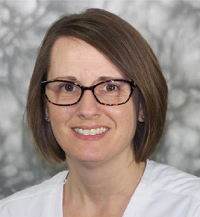
Briefly explain your project.
The project I completed for CNL was implementation of a Fast Track process in our Emergency Department in the Veteran Administration System in Des Moines. Briefly, we were able to dedicate four exam rooms in an unused area to be used for seeing non-acutely ill patients presenting to the Emergency Department. We triage patients based on the Emergency Severity Index scale and those that fall on the lower acuity end (ESI-4 and ESI-5) are able to be routed through our Fast Track, where their care is managed by a Physician Assistant and LPN. This frees up the Emergency Department beds to be used by patients with higher acuity illnesses that may require monitoring and higher-level care. It also alleviates congestion in the main Emergency Department, which decreases the need to periodically go on ambulance bypass.Explain your future plans as a clinical nurse leader.
My future plans as a Clinical Nurse Leader are currently in evolution. I have accepted a new position as Clinical Nurse Leader on the hospice/palliative floor in our Community Living Center. I am excited for this opportunity to fully function in the role of a Clinical Nurse Leader.How did the UI College of Nursing prepare you for your new role?
I feel the University of Iowa College of Nursing has given me a solid foundation to begin practicing as a Clinical Nurse Leader. I have made connections through my education at University of Iowa that will benefit me as I begin the role of Clinical Nurse Leader.-- Leanne Haiwick (MSN-CNL ’18)
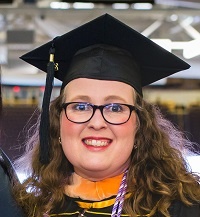
Briefly explain your project.
I chose to initiate an interdisciplinary Unit Based Council (UBC) for my CNL capstone project at the University of Iowa Hospital and Clinics. The microsystem assessment of my practice area revealed that our unit needed a forum to bring ideas from the frontline staff to the management and corporate levels of the hospital. A thorough literature search (which I learned how to conduct in the program) gathered ideas of what might work or not … and discovered tools (like the Nurse Practice Council effectiveness scale) to evaluate the performance of the UBC.Explain your future plans as a clinical nurse leader.
I am patiently waiting for the CNL role to be recognized by my current employer – with at least 50% NPC time for microsystem assessments and initiation of projects to improve patient care. In the meantime, while working as a staff nurse, I will continue to advocate for frontline staff – who want to see the best possible outcomes for the patients they directly work with…every shift.How did the UI College of Nursing prepare you for your new role?
The microsystem assessment, literature search, and implementation planning are much more effective when there is a step by step process. These tasks were not intuitive for me, but the CNL program gave a framework for performing these tasks, and I can use these tools to improve any patient care environment I am placed.-- Stephanie Lacquement (MSN-CNL ’18)